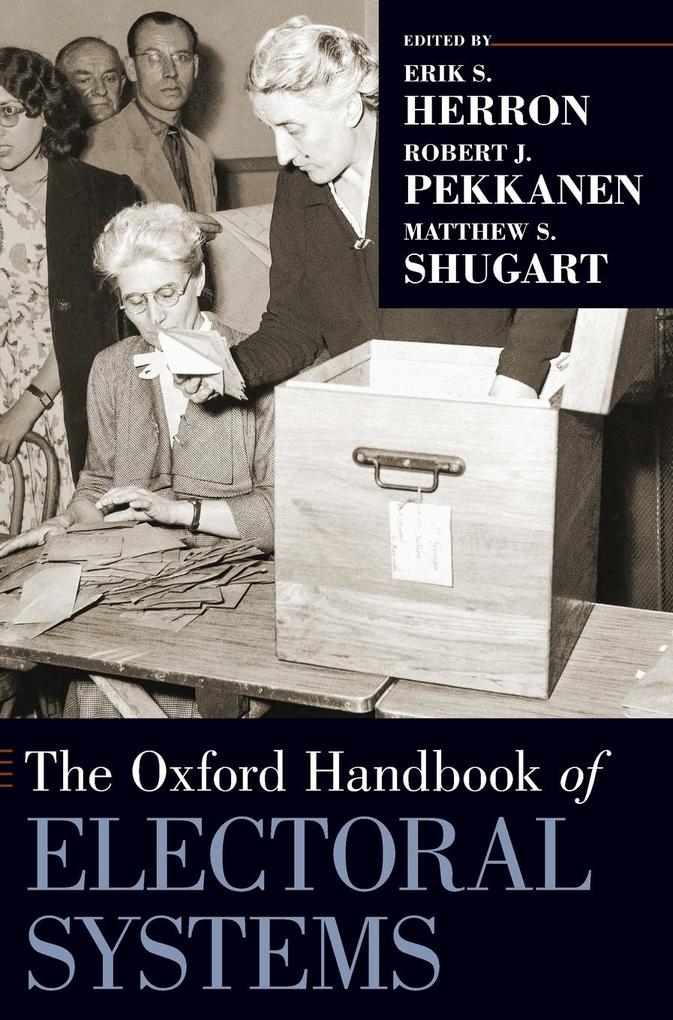
Zustellung: Sa, 02.08. - Do, 07.08.
Versand in 2 Wochen
VersandkostenfreiNo subject is more central to the study of politics than elections. Electoral systems--the rules about how voters' preferences are translated into election results--profoundly shape important political outcomes, including party systems, candidate selection, and policy choices. This volume provides an in-depth exploration of the origins and effects of electoral systems.
Inhaltsverzeichnis
- 1. Terminology and Basic Rules of Electoral Systems
- Erik S. Herron, Robert J. Pekkanen, and Matthew S. Shugart
- Part I. Foundations of Electoral Systems
- 2. Dimensions of Variation in Electoral Systems
- Michael Gallagher and Paul Mitchell
- 3. Electoral System Effects on Party Systems
- Matthew S. Shugart and Rein Taagepera
- 4. Party System Effects on Electoral Systems
- Josep M. Colomer
- 5. Electoral System Design in New Democracies
- John M. Carey
- 6. Electoral System Change
- Alan Renwick
- Part II. Issues and Representation
- 7. Social Diversity, Electoral Systems, and the Party System
- Robert Moser, Ethan Scheiner, and Heather Stoll
- 8. Electoral Systems and Ethnic Minority Representation
- David Lublin and Shaun Bowler
- 9. Electoral Systems and Women's Representation
- Mona Lena Krook
- 10. Electoral Systems and Voter Turnout
- Daniel M. Smith
- 11. Electoral Systems and Citizen-Elite Ideological Congruence
- Matthew Golder and Benjamin Ferland
- 12. Electoral Systems and Issue Polarization
- James F. Adams and Nathan J. Rexford
- Part III. Electoral Systems and the Wider Political System
- 13. Portfolio-maximizing Strategic Voting in Parliamentary Elections
- Gary W. Cox
- 14. Presidential and Legislative Elections
- Mark P. Jones
- 15. Electoral Systems and Legislative Organization
- Shane Martin
- 16. Electoral Systems and Roles in the Legislative Arena
- Audrey André and Sam Depauw
- 17. Electoral Systems and Constituency Service
- Brian F. Crisp and William M. Simoneau
- 18. Direct Democracy and Referendums
- Matt Qvortrup
- 19. Electoral Systems in Authoritarian States
- Jennifer Gandhi and Abigail L. Heller
- Part IV. Electoral Systems and Research Design
- 20. Election Data and Levels of Analysis
- Ken Kollman
- 21. Experimental Research Design in the Study of Electoral Systems
- Joshua Tucker and Dominik Duell
- 22. Reconciling Approaches in the Study of Mixed-Member Electoral Systems
- Erik S. Herron, Kuniaki Nemoto, and Misa Nishikawa
- Part V. Holding Elections
- 23. Election Administration
- Thad E. Hall
- 24. Electoral Systems and Electoral Integrity
- Pippa Norris
- 25. Electoral Systems and Redistricting
- Lisa Handley
- 26. Electoral Systems and Campaign Finance
- Joel W. Johnson
- Part VI. Electoral Systems in Context
- 27. Electoral Systems in Context: The Netherlands
- Kristof Jacobs
- 28. Electoral Systems in Context: Israel
- Reuven Y. Hazan, Reut Itzkovitch-Malka, and Gideon Rahat
- 29. Electoral Systems in Context: Finland
- Åsa von Schoultz
- 30. Electoral Systems in Context: United Kingdom
- Thomas Carl Lundberg
- 31. Electoral Systems in Context: Ireland
- Michael Marsh
- 32. Electoral Systems in Context: France
- Verónica Hoyo
- 33. Electoral Systems in Context: India
- Adam Ziegfeld
- 34. Electoral Systems in Context: United States
- Steven L. Taylor
- 35. Electoral Systems in Context: Canada
- Louis Massicotte
- 36. Electoral Systems in Context: Australia
- Ian McAllister and Toni Makkai
- 37. Electoral Systems in Context: Germany
- Thomas Zittel
- Part VII. Electoral Systems in the Context of Reform
- 38. Electoral Systems in Context: New Zealand
- Jack Vowles
- 39. Electoral Systems in Context: Japan
- Kuniaki Nemoto
- 40. Electoral Systems in Context: Italy
- Gianluca Passarelli
- 41. Electoral Systems in Context: Colombia
- Steven L. Taylor and Matthew S. Shugart
- Part VIII. Electoral Systems in the Context of New Democracies
- 42. Electoral Systems in Context: Ukraine
- Erik S. Herron
- 43. Electoral Systems in Context: Indonesia
- Nathan Allen
- 44. Electoral Systems in Context: South Africa
- Karen E. Ferree
Mehr aus dieser Reihe
Produktdetails
Erscheinungsdatum
12. April 2018
Sprache
englisch
Seitenanzahl
1016
Reihe
Oxford Handbooks
Herausgegeben von
Erik S Herron, Robert J Pekkanen, Matthew S Shugart
Verlag/Hersteller
Produktart
gebunden
Gewicht
1792 g
Größe (L/B/H)
249/178/66 mm
ISBN
9780190258658
Entdecken Sie mehr
Pressestimmen
The Oxford Handbook of Electoral Systems is a massive store of knowledge and information, with many of its chapters providing valuable and accessible resources Ron Johnston, LSE Review of Books
Bewertungen
0 Bewertungen
Es wurden noch keine Bewertungen abgegeben. Schreiben Sie die erste Bewertung zu "Oxford Handbook of Electoral Systems" und helfen Sie damit anderen bei der Kaufentscheidung.

































